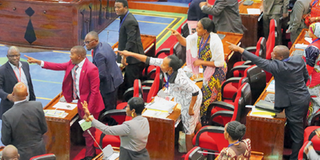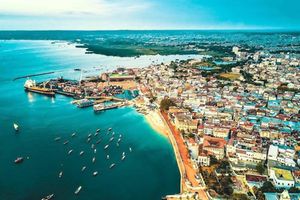Is Dar’s image as haven of peace under threat?

Members of Parliament protest in the National Assembly during a past session. There are growing concerns over the lack of consensus among the country’s politicians, with some analysts fearing it could damage Tanzania’s reputation. PHOTO I FILE
What you need to know:
- While there are mixed feelings from various quarters on the extent of the impact of the prevailing divisive politics, some analysts are of the opinion that Tanzania’s image as the region’s beacon of peace is facing a testing period.
Dar es Salaam. The political hyperactivity of the recent past has seen divisions widening in the country, with some analysts blaming it on what they say is the government’s intolerance for the opposition, while others accuse the latter of fomenting unnecessary anti-establishment drama in a bid to frustrate the fifth phase administration’s positive-yielding reform drive.
While there are mixed feelings from various quarters on the extent of the impact of the prevailing divisive politics, some analysts are of the opinion that Tanzania’s image as the region’s beacon of peace is facing a testing period.
Since it gained independence in 1961, Tanzania has been playing a critical role in efforts to maintain peace and stability in the region, something which has over the years earned the East African giant a reputation as a model and source of inspiration for her neighbours that are troubled by incessant fighting.
Among other things, the country has also successfully participated in efforts to usher in peace in various countries across Africa – by supporting a good number of the continent’s liberation movements and taking the centre stage in bringing fighting forces to the negotiating table.
The founding father, Julius Nyerere, was also involved in peace negotiations in Burundi until his death, and up to now, the country continues to enjoy good relations with its troubled neighbours.
In recent years, amid persistent civil war in Burundi, Tanzania has continued being the place to rush to, not only for the civilians victimised by years of bloodshed, but also for the squabbling politicians, whose trust in the country’s ability to help secure a peaceful resolution has been more than apparent.
Retired President Benjamin Mkapa is currently the chief mediator in the Burundi crisis. His high-profile picking to resolve the tricky crisis came after then-President Jakaya Kikwete pulled a shocker in Kenya when he brought together then-President Mwai Kibaki and Raila Odinga into a government of national unity following a bloody post-election violence.
Granted, it has taken years to build the image of peace and peacemakers in Tanzania – the only East African Community (EAC) member state to have not suffered the kind of political upheaval unfolding in countries like Kenya, Uganda, Burundi and South Sudan.
Yet there are growing concerns that Tanzania faces a testing time to keep that record.
Many are pointing an accusing finger at divisive politics.
At a press conference in Nairobi a fortnight ago, outspoken opposition Chief Whip Tundu Lissu sought to lobby the international community against the fifth phase government citing the attempt on his life last year as symptomatic of how bad the situation had become.
The lawyer, who blamed his shooting on political intolerance, appealed to the international community to pile pressure on the government he accused of trampling on human rights.
In an interview with Political Platform, Dr Moses Shirima of Kampala University noted that despite the heightened political drama, Tanzania still enjoyed its reputation as a haven of peace. But he was quick to point out that the country is going through a testing period as far as the safeguarding of that image is concerned.
He also said that the “worsening political climate should not be ignored or underestimated” but be addressed to preserve the climate of peace the country has enjoyed over the years.
Prof Josiah Mwakipesi, a political science and administration lecturer at the University of Dar es Salaam (UDSM) concurs.
He says: “As the recent political trend shows, our country’s good image is at stake; we must try to understand what has caused unsettled disputes in neighbouring countries.”
Prof Mwakipesi cited the lack of consensus by political parties, crackdown on the opposition and climate of fear among the citizens who can no longer freely express their views as some of the negative factors that are not good for the country’s public relations.
Mr Lucas Gamanywa, a political commentator in Dar es Salaam, says events of the recent past have ushered in a new era of undesirable politics.
“The country’s image is at stake. It is as if we are returning to being a one-party state. No freedom of speech, this is not the Tanzania that I grew up knowing,” he notes.
However, Dr Benson Bana from the University of Dar es Salaam suggests fears that Tanzania faces a serious public relations crisis are exaggerated.
“Isolated incidents”
He said the country’s image is not yet under any threat because “isolated incidents” cannot be used to define the country’s peace status.
“Even though the government is obliged to protect its people, criminal and isolated incidents should not be used to undermine the government’s reform drive,” Dr Bana said.
“The opposition has mischief within itself and it cannot keep on blaming the government.”
Dr Bana opinionated that Tanzania will continue to enjoy its place as a beacon of peace in the region.
Mr Leopold Katubayemwo, an assistant lecturer at St Augustine University of Tanzania (Saut), agrees.
Peace as a culture
He is also of the opinion that the country’s image is not yet under any threat because the developments witnessed in the recent past are at the political level. According to him, the majority Tanzanians still embrace peace as a culture.
“It is thus the responsibility of all Tanzanians to refuse being driven by politicians who plant seeds of divisions, which at the end lead to polarisation,” he says.
Mr Katubayemwo, nevertheless, quickly warns that some events taking place in the country could send “a wrong signal to the international community and that may affect our position on the peace index”.
“All the same, I am still optimistic that our neighbouring countries and the rest of the world still see us as an oasis of hope in the Great Lakes region and the whole of Africa.”
And Husein Juma, also a political commentator, shares the same optimism.
“The fifth government is committed to transforming this nation, we will remain a beacon of peace in the region.”




